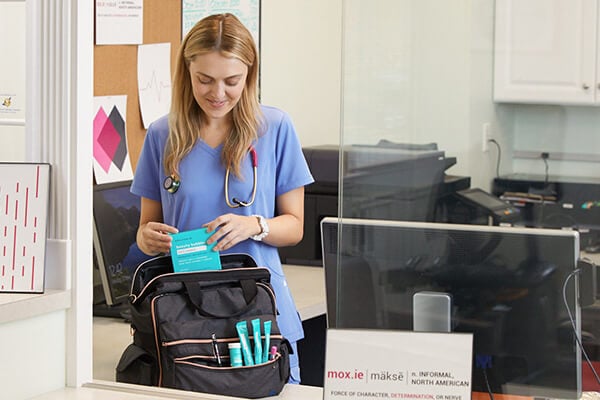Written by Mary Deis
It’s been said for years that “nurses are the worst patients.” As a nurse, I admit that I’m not innocent in this regard. I don’t have a primary care provider even though I tell most patients at discharge in the emergency room (ER) to “follow up with your primary care provider.” Although I work out and try to eat healthfully, I eat more ice cream than the average person. My father spent his career working in dairy science, which means always had ice cream at our house. As an adult, I still always have ice cream at my house and this is something I don’t plan to change.
Between shifts I usually don’t sleep enough and often after three shifts in a row, I’m bleary eyed and maybe a little grumpy. I spend my shifts advocating for, thinking of, and carrying out interventions to care for my patients. I’m a bit of a nerd when it comes to nursing because I love it so much. I’m happy to throw myself into the care of my patients. The truth is, I can be my own favorite patient if I try. At work and in my time off, I should be doing the same interventions for my nursing teammates and myself. Here are a few ideas on how you can be your own favorite patient.
Set Aside Time to Exercise
If you’re not passionate about working out, explore different types of physical activity until you find something you enjoy. Even if you’re not a runner you might enjoy simple walks outside. Maybe you enjoy the motivation and community of group workout classes - if so there’s a plethora of different options for you.
Regardless of what you choose, set aside a time block of your day for activity. Stick to this commitment just as you would stick to a nursing care plan for your patient. Exercise can be invigorating and improve your overall health. Strong core and back muscles can help prevent workplace injuries. A bedbound intubated patient needs passive range of motion exercises to keep his or her muscles from atrophying, and if you’re an intensive care nurse you’re likely used to budgeting time before or after a Q2 hour turn for that.
A large percentage of hospitalized and home health patients need help from our physical or occupational therapy colleagues. We work hard to make appropriate time in the day for these therapies to help improve patients with these movements. As nurses we know how to block and budget time for the wellness of our patients. Replicate what you already know how to do for patients and apply it to yourself.
Sleep Hygiene… for Yourself
Five years ago I was involved in a new graduate nurse residency program at my hospital. We had the opportunity to present and review the projects of our peers. I still remember a very interesting presentation that covered how to improve the sleep hygiene of hospitalized patients. One suggestion to assist patients in falling asleep faster after nurse interventions was for the nurses to wear red glow lights instead of turning on the lights in the middle of the night.
They recommended television turnoff times, especially because our hospital was old and many of the rooms were shared with a roommate. They didn’t forget the timeless nursing intervention of proactive toileting to reduce the chance that patients would have to wake up in the middle of the night to go.
These interventions are simple but can be applied to the everyday lives of nurses to improve our own sleep hygiene. We might not need red lights for ourselves, but think of limiting the opposite - blue light. Cell phones and other electronic lights from screens stimulate the brain just before bed. As a night shift travel nurse, I now religiously use a face mask to block out all unnecessary light while I’m trying to get my beauty rest.
Drink water during the day, but avoid caffeine and relieve yourself just before bed to reduce disrupted sleep. If you just can’t shut your brain off, consider practicing prayer (if you’re religious), meditation, listening to calming music, or white noise to relax. If you wake up rested, you can avoid being “that patient” that doesn’t return your ‘good morning’ greeting.
Set out your favorite, most comfortable medical scrubs the night before to reduce decision fatigue and stress in your morning.
Attend Your Checkup Appointments and Take Your Meds!
Even if you think you don’t need it, get yourself a primary care provider and (at least!) do your annual or biannual physical. Preventative healthcare improve your chances of catching illness before it’s serious. Seeing a provider before you have a problem makes it easier to get an appointment when something pops up unexpectedly.
It’s important to build trust between you and your provider. Think about how much more successful you are in the care of your patients when they trust you - the same is? true in your primary care provider’s ability to care for you. And, if you have medications to take but forget, consider buying a pillbox to take with you, on the go or to work, so you don’t forget to take your own medication.
The best way to ensure excellent care for others is to care for yourself first. Assess your needs and diagnose your problem. Then, think about how to fix it. Once you have a plan, implement it. To see if it’s successful, continuously reevaluate your health. Sound familiar? Care for yourself and break out of the ‘nurses are the worst patients’ phenomenon. Start a new trend advocating for the health of other nurses and yourself.
About the Author:
A registered nurse since 2016, Mary Deis has experience in internal medicine, international medical aid and emergency medicine where she currently practices. Mary is most passionate about empowering patients through education and creating safe, supportive work environments for nurses. In her free time Mary finds joy in her catholic faith, running, trying new recipes, and spending time with friends and family.




